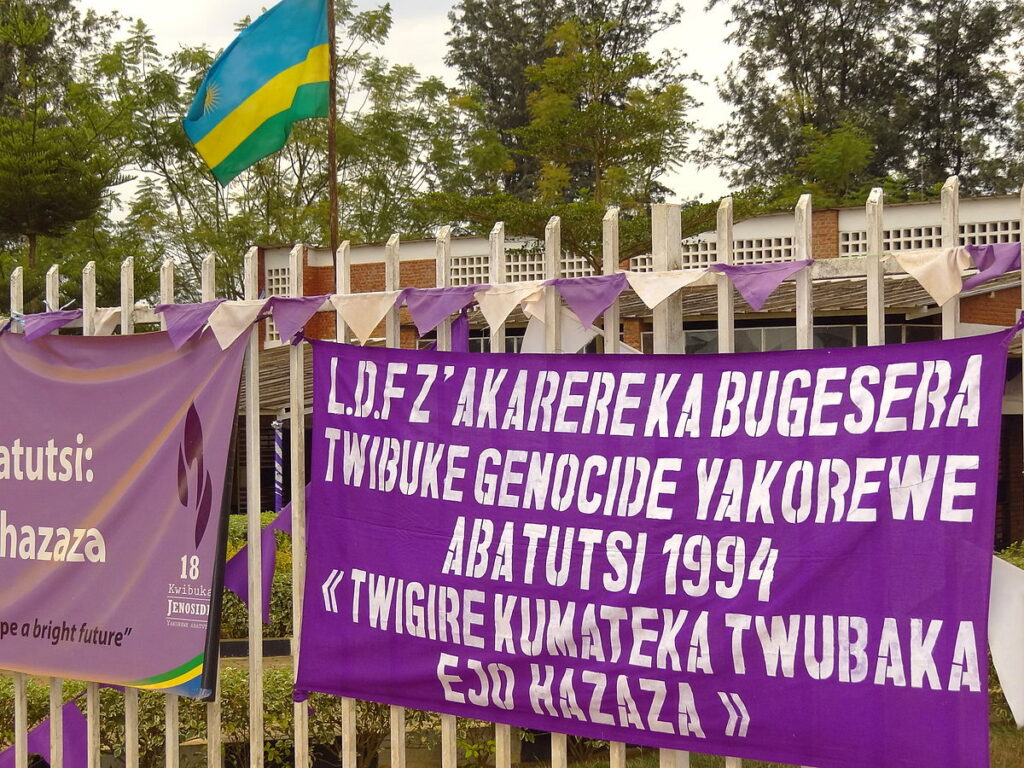- About Ramapo
- Academics
- Admissions & Aid
- Student Life
- Athletics
- Alumni
- Arts & Community
- Quick Links
- Apply
- Visit
- Give
Kwibuka 30, Panel 19
A banner commemorating the 18th Anniversary of the 1994 Genocide Against the Tutsi in Nyamata, Rwanda. The text translates as, “L.D.FZ’ Let us remember the 1994 genocide of the Tutsi ‘From history we build the future.’”
Denial of the 1994 Genocide of Tutsi in Rwanda
A banner commemorating the eighteenth remembrance of the 1994 Genocide Against the Tutsi, displayed in Nyamata, Rwanda, reads, “From history, we build the future.” There is denial in every genocide that has occurred, and there will be denial in any future genocides. It is almost inevitable, which is a reason why the study of genocide denial is so vital. There are a multitude of reasons for genocide denial. One of the leading causes—or perhaps opportunities—is the fact that there are most often unanswered questions and competing historical narratives, rooted in complexly intertwined histories. Such open-ended questions allow people to certain elements or the entirety of the 1994 genocide—despite evidence, witness testimonies, journalism, and scholarship. Whether we consider literal, interpretive, or implicational denial, rationalization or trivialization, parties continue to distort the past and its traces. However, no amount of hate speech, denial, and negativity will erase the one of the most brutal genocides of the last century.
Quick Links
Elementary forms of collective denial: The 1994 Rwanda Genocide
Denying genocide: The Rwanda plan
Genocide Denial Criminalization: Rwanda’s Application and Misuse of Genocide Denial Laws
Bibliography
Altanian, Melanie. “Prejudice and the Claim to Objectivity: Crucial Elements of Genocide Denialism.” A Working Paper of the Archives against Genocide Denialism? Swisspeace, 2017.
Ketumile Masire. “Letter from Ketumile Masire, Chairman of the International Panel of Eminent Personalities (IPEP) Regarding the Panel’s First Meeting on Investigatigation of the 1994 Genocide in Rwanda.” United Nations, 1999.
Mirzoeff, Nicholas. “Invisible Again: Rwanda and Representation after Genocide.” African Arts 38, no. 3 (2005): 36–96.
Rwandan Genocide: The Essential Reference Guide. United States: Bloomsbury Academic, 2018.
Photo Source
Adam Jones, PhD, “Banners Commemorating 18th Anniversary of Rwandan Genocide – Outside Catholic Church Memorial – Nyamata – Rwanda” (2012). WikiCommons.
Copyright ©2025 Ramapo College Of New Jersey. Statements And Policies. Contact Webmaster.


Follow Us!